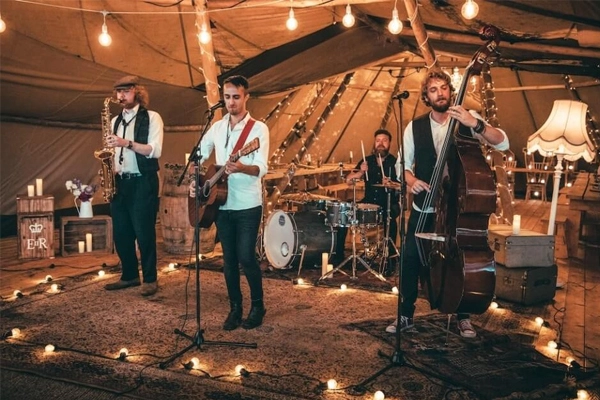Music and singers at wedding receptions play a crucial role in creating the atmosphere and joy of the event. The right music sets the tone for the celebration, from the moment guests arrive to the final dance of the night. It helps in creating memorable moments, whether it’s a romantic first dance, an emotional father-daughter dance, or a lively group dance that gets everyone on their feet. The choice between a live band and a DJ can significantly influence the vibe of the reception. A live band can offer a dynamic and interactive performance, adding a touch of elegance and energy, while a DJ can provide a seamless mix of songs and cater to a wide range of musical preferences.
Here are the most important considerations when planning the music for your wedding reception. First, consider the musical preferences of you and your partner, as well as those of your guests, to ensure a diverse playlist that appeals to everyone. Second, evaluate the experience and reputation of potential performers by reading reviews and watching videos of their performances. Third, meet with your chosen band or DJ to discuss your vision, special requests, and the flow of the event. Finally, ensure all agreements are clearly stated in a written contract, covering performance times, breaks, and specific requirements. By carefully planning and selecting the right music and performers, you can create a joyful and memorable atmosphere for your wedding reception:
- Selecting a Talented Singer: Choosing a singer with a strong voice and skill in performing wedding music is vital. The music group should match the taste and style of your event. Music planning for the ceremony should include selecting appropriate pieces for moments such as the entrance of the bride and groom, cake cutting, and dance segments.
- Diversity in Music: Offering a variety of music is crucial for engaging all guests. This includes local music, popular songs, and various music styles to cater to different preferences.
- Interaction with Guests: The singer and music group should interact with guests, providing a lively and energetic performance to ensure that attendees feel satisfied and joyful.
- Time Management: It is important to schedule the music according to the timeline of the ceremony, ensuring that key moments are well-executed.
- Experience and Professionalism: The singer and music group should have sufficient experience in performing at weddings and be familiar with different event conditions.
By following these points, the music and singers can create a joyful and memorable wedding for the couple and their guests.
Choosing the Right Singer and Music Group for Your Wedding
Selecting a singer and music group for your wedding is a significant process that requires careful attention. Here are some tips:
Research and Selection: Begin by researching different music groups and singers. This includes watching videos and photos of previous performances, reading reviews from previous clients, and obtaining audio and video samples. The Ramarossi event planning team can assist with this by offering the best music groups and popular singers that match your taste.
Contracts and Terms: Before signing a contract, carefully review the terms and prices. Ensure that costs, timings, payment methods, equipment used, and other details are clearly specified.
Agreements and Planning: Once chosen, review all performance details with the singer and music group and make necessary arrangements. This includes setting the timeline, selecting songs, and agreeing on any issues that may arise during the event. Ramarossi can handle these arrangements, allowing you to select your music group and singer with peace of mind.
Continuous Communication: Maintain ongoing interaction with the singer and music group. Discuss any changes or new needs before and during the event to ensure a successful ceremony.
Music Planning for the Wedding
Effective music planning is essential for a joyful and memorable wedding. Here are the key steps:
Determine the Type of Music: Decide whether you want live music (with a music group or singer) or pre-recorded music.
Set the Timeline: Specify the ceremony’s schedule and the times when music should be played, such as the entrance of the groom and bride, cake cutting, and break periods.
Select Appropriate Songs: Choose suitable songs for each part of the ceremony. For instance, select specific songs for the entrance of the groom and bride that match their personalities. Ramarossi can suggest the best music options for special moments.
Ensure Music Diversity: Ramarossi aims to provide diverse music to accommodate all guests, including local music, pop, dance, and other styles.
By adhering to these guidelines, you can ensure that the music and singer at your wedding contribute to a successful and memorable event.
Background Music Selection
Choosing background music is important for parts of the ceremony that require it, such as guest arrival, dining, and breaks. The right background music sets the tone as guests arrive, creating a welcoming and elegant atmosphere that immediately puts them in a celebratory mood. Soft, instrumental music or gentle acoustic tracks can provide a sophisticated ambiance without overpowering conversations. It’s essential to choose songs that are soothing and pleasant, ensuring that guests feel comfortable and engaged from the moment they step into the venue.
During dining, background music continues to play a vital role in maintaining a relaxed and enjoyable atmosphere. Select songs that complement the dining experience, enhancing the overall mood without distracting from conversations and the enjoyment of the meal. Light jazz, classical pieces, or mellow pop songs can be excellent choices. Additionally, consider the volume and tempo of the music to ensure it remains unobtrusive yet enriching. For breaks, such as pauses between speeches or during transitions, background music helps maintain the flow of the event, filling any potential awkward silences and keeping the energy consistent. By thoughtfully selecting background music for these key moments, you can create a seamless and delightful experience for your guests throughout the entire ceremony.
Sound System Setup
One of the most crucial aspects of music and singers at wedding receptions is the sound system setup. Ensure the sound system is well-adjusted so that the sound reaches all guests, even those seated farther away. The Ramarossi event planning team can provide the best sound system setups for your ceremony.
Agreements with Singers or Music Groups
If you are using a singer or music group, review and agree on all details related to the music program and performance before the ceremony. Make sure to conduct a final test and adjustments before the event to ensure everything works correctly.
By following these steps, music planning for the wedding will be precise and comprehensive, turning your ceremony into an exceptional experience.
Music Diversity at Weddings
Music diversity can take various forms to accommodate all guests and create a lively and dynamic atmosphere. Here are some ways to plan diverse music for your wedding:
Catering to Guest Preferences: Consider the varied musical tastes of your guests. Select songs from different genres such as pop, rock, classical, rap, and local music.
Local Music: If the wedding is held in a specific region, choosing local music can create a special atmosphere and a stronger connection with the guests. This includes local songs, dances, and traditions.
Popular and Well-Known Songs: Choosing popular and well-known songs can add more appeal to your wedding and encourage guests to dance and enjoy themselves.
Live and Pre-Recorded Music: A mix of live and pre-recorded music can bring interesting diversity to your wedding. This allows you to enjoy various styles and performances.
Variety of Dances: Hosting various dances such as traditional, Latin, pop, and tango can enhance music diversity and engage guests.
Mix of Old and New Songs: Combining old and new songs allows guests of all ages to enjoy music that appeals to them.
Maintaining Sequence: Ensure that the music diversity does not disrupt the flow and coherence of the ceremony. The music sequence should align with the ceremony’s progression.
By considering these points, with the help of the Ramarossi event planning team, you can have a diverse and appealing music program for your wedding that keeps all guests happy and entertained.
Agreements and Planning for Music and Singers at Weddings
Pay attention to key points when planning and agreeing on music and singers for your wedding:
Determining Needs and Preferences: Discuss and determine your and your partner’s needs and preferences regarding music and the desired singer.
Defining Musical Taste: Consider the type and style of music you prefer (live or pre-recorded) and preferences regarding the music group or singer.
Researching Various Groups and Singers: Watch videos and photos of previous performances, listen to audio samples, and read reviews from previous clients.
Contacting Singers or Music Groups: Have your event planning team contact the singer or music group to discuss availability dates and contract terms.
Discussing Music Program Details: Talk about the music program, performance times, and necessary costs.
By following these steps and planning carefully, you can organize a joyous and memorable wedding with the help of the Ramarossi event planning team, making the most of music and singers.
FAQs
- What type of music is best for a wedding reception?
Answer: The best type of music for a wedding reception typically includes a mix of genres to cater to different tastes and age groups. Popular choices include classic love songs, contemporary pop hits, jazz standards, and dance music. It’s important to balance slow songs for romantic moments and upbeat tracks for lively dancing.
- Should we hire a live band or a DJ for our wedding reception?
Answer: The choice between a live band and a DJ depends on your personal preference, budget, and the atmosphere you want to create. A live band offers an energetic and interactive performance, which can be great for engaging the crowd. A DJ, on the other hand, can provide a diverse range of music and keep the party going with seamless transitions between songs. Some couples even opt for both to get the best of both worlds.
- How do we choose the right singer or band for our wedding reception?
Answer: Choosing the right singer or band involves several steps:
Research: Look for artists with good reviews and recommendations. Listen to their music online to ensure their style matches your taste.
Experience: Select performers who have experience with weddings, as they will be more familiar with the flow of the event and know how to entertain a diverse crowd.
Meeting: Meet with the potential performers to discuss your preferences, special requests, and ensure they understand your vision for the reception.
Contract: Make sure everything is clear in a written contract, including performance times, breaks, and any specific requirements.
- What are some must-have songs for a wedding reception playlist?
Answer: Must-have songs for a wedding reception playlist often include:
First Dance: A romantic song that is meaningful to the couple.
Parent Dances: Songs that are sentimental and appropriate for the bride’s dance with her father and the groom’s dance with his mother.
Party Starters: Upbeat tracks that will get guests on the dance floor, such as “Uptown Funk” by Bruno Mars, “Shut Up and Dance” by Walk the Moon, and “Dancing Queen” by ABBA.
Classic Hits: Songs that are universally loved across generations, like “Don’t Stop Believin'” by Journey and “Sweet Caroline” by Neil Diamond.
- How can we ensure that the music will appeal to all our guests?
Answer: To ensure the music appeals to all guests:
Diverse Playlist: Create a diverse playlist that includes various genres and eras to cater to different tastes.
Guest Input: Consider asking for song requests from guests in advance or on the wedding RSVP.
Balance: Mix slow and fast songs to provide moments for dancing as well as for socializing and relaxation.
Professional Guidance: Trust your DJ or bandleader to read the crowd and adjust the music accordingly to maintain a lively and enjoyable atmosphere.


